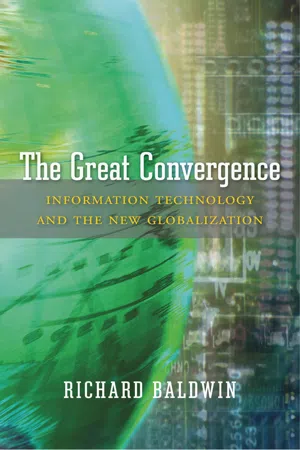
- English
- PDF
- Available on iOS & Android
About this book
An Economist Best Book of the Year
A Financial Times Best Economics Book of the Year
A Fast Company "7 Books Microsoft CEO Satya Nadella Says You Need to Lead Smarter"
Between 1820 and 1990, the share of world income going to today's wealthy nations soared from twenty percent to almost seventy. Since then, that share has plummeted to where it was in 1900. As the renowned economist Richard Baldwin reveals, this reversal of fortune reflects a new age of globalization that is drastically different from the old. The nature of globalization has changed, but our thinking about it has not.
Baldwin argues that the New Globalization is driven by knowledge crossing borders, not just goods. That is why its impact is more sudden, more individual, more unpredictable, and more uncontrollable than before—which presents developed nations with unprecedented challenges as they struggle to maintain reliable growth and social cohesion. It is the driving force behind what Baldwin calls "The Great Convergence," as Asian economies catch up with the West.
"In this brilliant book, Baldwin has succeeded in saying something both new and true about globalization."
—Martin Wolf, Financial Times
"A very powerful description of the newest phase of globalization."
—Larry Summers, former U.S. Secretary of the Treasury
"An essential book for understanding how modern trade works via global supply chains. An antidote to the protectionist nonsense being peddled by some politicians today."
—The Economist
"[An] indispensable guide to understanding how globalization has got us here and where it is likely to take us next."
—Alan Beattie, Financial Times
Tools to learn more effectively

Saving Books

Keyword Search

Annotating Text

Listen to it instead
Information


Table of contents
- Cover
- Title
- Copyright
- Dedication
- Contents
- Introduction
- Part I: The Long History of Globalization in Short
- Part II: Extending the Globalization Narrative
- Part III: Understanding Globalization’s Changes
- Part IV: Why It Matters
- Part V: Looking Ahead
- Notes
- Acknowledgments
- Index
Frequently asked questions
- Essential is ideal for learners and professionals who enjoy exploring a wide range of subjects. Access the Essential Library with 800,000+ trusted titles and best-sellers across business, personal growth, and the humanities. Includes unlimited reading time and Standard Read Aloud voice.
- Complete: Perfect for advanced learners and researchers needing full, unrestricted access. Unlock 1.4M+ books across hundreds of subjects, including academic and specialized titles. The Complete Plan also includes advanced features like Premium Read Aloud and Research Assistant.
Please note we cannot support devices running on iOS 13 and Android 7 or earlier. Learn more about using the app